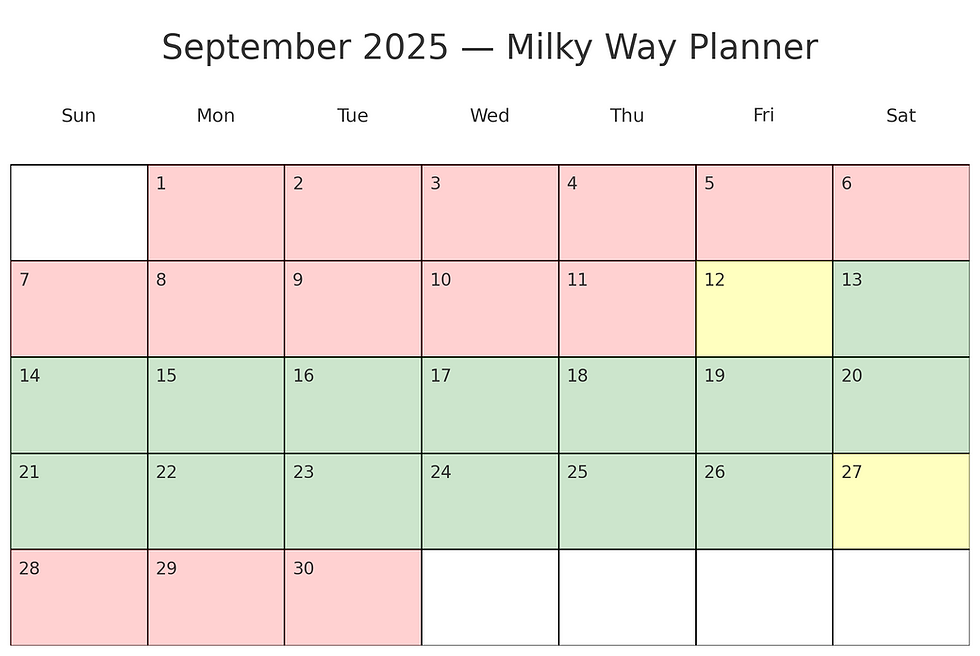Best Astrophotography Dates in September 2025: Night Sky Calendar
- Ryan Oswald
- Aug 28, 2025
- 4 min read
What to shoot in the night sky in September 2025
See key dates, moon phases and the best evenings to shoot the Milky Way (Sep 12–26), plus easy add-ons like Saturn at opposition and the zodiacal light before dawn late in the month.
Top Astrophotography Nights — September 2025
Best Milky Way Run: Sep 12–26
Sep 12 = marginal but usable (low moon glow on the horizon).
Sep 13–26 = prime (dark evenings + core still high enough for strong compositions).
Sep 27 = skip (technically dark for a bit, but quality drops vs. the 13–26 stretch).
Planet spotlight: Saturn near opposition (~Sep 21) — bright, up all night; pair with telephoto or as a point of interest in early-evening Milky Way frames.
Season note: Autumnal equinox (~Sep 22) → improved chance of zodiacal light in the east about 60-90 min before sunrise late month.
Meteor Showers
Alpha Aurigids (Aurigids)
Peak Night: Sep 1 (pre-dawn)
Active Window: ~Aug 28 – Sep 5
Best Time to Shoot: 3:00 AM to pre-dawn
Expected Rate: Variable, often ~10/hr (moonlight reduces faint meteors)
September Epsilon Perseids
Peak Night: Sep 9 (pre-dawn)
Active Window: Sep 5–21
Best Time to Shoot: 2:00 AM to pre-dawn
Expected Rate: Low; near full moon week hurts visibility
Southern Taurids (fireball-prone, slow)
This meteor shower event is longer than others and known for producing bright fireballs, with a low rate of meteors per around, only around 5
Activity Begins: ~Sep 23 (builds in Oct/Nov)
Tip: Treat as a bonus while shooting wide nightscapes; rates are sparse but meteors can be bright
Full Moon
Peak Night: Mon, Sep 8
Best Time to Shoot the Moon: After moonrise on Sep 8 (harvest moon look over desert terrain)
Direction in Sky: Rising in the East (sets in the West near sunrise)
Days You Can Shoot the Milky Way in September
15
Prime (green): Sep 13–26
Marginal but usable (yellow): Sep 12 — keep the core well above the horizon and use terrain to block moon glow
Not recommended vs. the rest (red): Sep 27

Notes:
In September, the core is an evening target. Window is astronomical dusk → ~midnight and shrinks through the month.
Best “look” most nights: ~9:00–10:30 PM while the core is still reasonably high.
Milky Way Core Visibility
MILKY WAY RISE | ALREADY UP BY ASTRONOMICAL DUSK |
MILKY WAY SET | ~11:45 PM - 12:20 AM |
DIRECTION | S → SW |
PRACTICAL WINDOW | ~8:20-8:45 PM - 12:00 AM |
*APPROXIMATE MILKY WAY INFO (BASED ON MOAB LOCATION)
Moon Phases
🌕
FULL MOON
SEPTEMBER 8
🌑
NEW MOON
SEPTEMBER 22
Tips & Guides
Sep 12 (marginal): Shoot west-facing scenes to keep moonlight behind you; consider blue-hour foreground + darker-sky blend.
Sep 13–26 (prime): Front-load longer comps around Sep 13–20 while the core is higher. Expect mild airglow; stack or plan a two-exposure sky/ground.
Saturn week: For planetary detail, record short high-frame-rate clips and stack; for nightscapes, a 50–135 mm lens pairs Saturn with dust lanes early evening.
Zodiacal light: Late-month, arrive 60-90 min before sunrise, aim east.
Want better meteor shots? Check out our Meteor Shower Shooting Guide
Want monthly alerts like this?
Join the Night Sky Watch List.
Get Milky Way Alerts + Meteor Shower Dates delivered before each new-moon window.
Bisti Badlands Nightscape Workshop — Sep 16–21, 2025
We coach. You shoot. You leave with finished images.
New-moon nightscapes among Bisti’s alien hoodoos—plus a full edit day at our Airbnb.
You’ll come away with:
Portfolio Milky Way images from Bisti (we have lots of past student examples from this exact location)
A repeatable story-driven composition system (visual pathways, subject hierarchy, color relationships)
Finished edits from your RAW files (end-to-end workflow on our dedicated edit day)
Optional: Tracked Milky Way for cleaner stars (bring a tracker if you want this).
If time/conditions allow, we can attempt a simple DSO (e.g., Andromeda/Double Cluster) as a bonus—not required.
What we do
Scouting & Storytelling: Build your frame around visual pathways—lead-ins, echo shapes, and balance with the sky.
Night Sessions (new-moon window): Multiple nights at hero locations; we do not shoot—we’re at your side adjusting settings, focus, and timing.
Cultural Access: Our Navajo guide leads us into a sacred location; we follow all cultural and land-use guidelines with respect.
Edit Day (Airbnb): Full-day lab from RAW to final: stacking/blending as needed, luminosity control, color work, star management, finishing touches.
You leave with completed images, a step-by-step recipe, and your layered files.
Who this is for
You’re interested in guided composition + a professional finishing workflow.
You’re excited to build story-first images instead of snapshots.
Group size & attention
Small groups to ensure every photographer gets plenty of 1:1 time with instructors.
What’s included
Field instruction (evenings + night sessions)
Full-day edit lab (Airbnb)
Location planning, map pins, composition notes
Guided access with Navajo guide (permits/fees we arrange)
FAQ: Astrophotography in September
What nights are best to photograph the Milky Way?
Sep 13–26. Sep 12 is usable with careful composition; Sep 27 is a step down vs the prime run.
When should I shoot each night?
From astronomical dusk until roughly midnight. Peak look most nights is ~9:00–10:30 PM.
Any special events?
Saturn near opposition (~Sep 21) for planet imaging; zodiacal light pre-dawn late month. Meteor activity is modest.












Comments